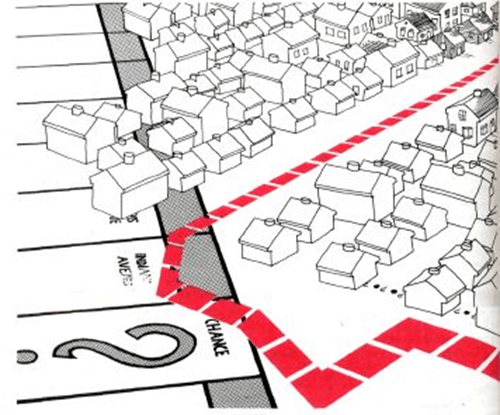Our dear friend and award-winning author Nawaz Merchant writes…
Until 1968 black families were systematically discriminated against in housing (a process called redlining), which led to economic and education gaps. Those yawning gaps of past decades erupt in racial conflict in cities like Minneapolis.
Our evening walk in Island Heights, New Jersey took an intriguing turn when an elderly man stepped up to my cousin, who is rather dark-skinned, and said, “May I give you something?”
She stepped back in surprise, glancing at the rest of us for an explanation or a hint of how to answer. Laughing, she said, “Well, I have my bodyguards right here…”
The old man said, “It’s just a prayer.” Then he recited the Celtic poem, ”May the road rise up to meet you. May the wind be always at your back. May the sun shine warm upon your face; the rains fall soft upon your fields and until we meet again, may God hold you in the palm of His hand.”
After we chatted for a few minutes, he said, “Well, I’m 92. Other than losing my wife in 2017, I’ve had a good life.” He’d been an attendant at the TB Hospital in Staten Island. His wife had been a police officer.
Then he said, “Tell you a funny story. When I came to Toms River (Jersey Shore), I was looking for a house. I met a realtor, but I told her, ‘I have no money.’ Well, that lady shrugged and said, ‘Give me your hand.’ She put ten dollars on my palm and pointed to a map. ‘Here’s the plot you’re going to buy with that.’ Well, it’s where I built our place and I’ve lived there sixty years.”
Needless to say, the realtor was white, like him.
While I appreciate the old gent’s nostalgic reminiscences, and his homilies about giving back and sharing kindness along the way, I wonder how that realtor treated black families who struggled to save enough for a down payment. While I don’t expect her to hand over ten dollars or a free plot of land, would she have even allowed them to buy in the new development? History records that until 1968 black families were systematically discriminated against in housing (a process called redlining), which led to economic and education gaps.
“Housing discrimination prevented blacks from owning homes for more than a century, which continues to affect purchasing power today,” says Sheharyar Bokhari, a senior economist with Redfin real estate brokerage in Cambridge, Mass.
In 1940, the median home value in the US was just $2,938, notes a CNBC article. In 2017, it was $199,200. This growth in asset values can change the trajectory of a family for generations, Michele Lerner points out in an article in The Washington Post. Economic gaps also widened because the US tax code allows mortgage interest payments to be tax deductible. So, renters paying $2000 a month get no break in tax, while families building equity in their home (and thereby growing their assets) get a third off their interest payment (based on their tax rate) courtesy of the US government. This encourages families to take on larger homes and mortgages, which stimulates the economy. Combined with the selective bias against black borrowers, it favors the (predominantly white) homebuyer.
Education gaps also widened over the decades, since black families still predominantly live in formerly “red-lined” neighborhoods. The lower property values result in a lower tax base, which reflects a lower standard of education and consequent loss of college admission opportunities.
As the dusk faded into night, our elderly white friend smiled and said goodnight as we wished him well. He benefited from the predominant racism of the realtor community. I appreciated his open-hearted warmth. Perhaps that realtor’s gift gave him a benevolent attitude for the rest of his life.
Yet that yawning gap of past decades erupts in racial conflict in cities like Minneapolis in Minnesota, which has one of the widest racial property gaps in the country. Anyone questioning why the black community lags economically needs to reassess their own good fortune and the gifts they have been handed, the education and ability to earn a decent income.
Illustration courtesy: www.lib.niu.edu

